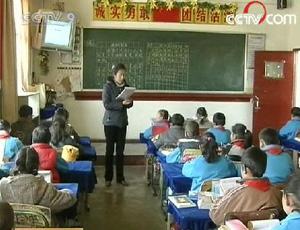China
Tibetan education thriving in Tibet
WATCH VIDEO
Source: CCTV.com | 04-17-2008 08:42
Special Report: Tibet TodayIn Tibet, the education department has been making efforts to promote a Chinese-Tibetan bilingual education system.
 |
| In Tibet, the education department has been making efforts to promote a Chinese-Tibetan bilingual education system. (CCTV.com) |
The Tibetan language is a major component of primary school education.
This is a third-year classroom at Lhasa's Number One Primary School. The children are all under 10, but they can write beautiful Tibetan.
Student of Number One Primary School, Lhasa, said, "I like Tibetan classes because there are a lot of poems and stories in our Tibetan textbooks."
This was the first ordinary primary school to open in Tibet. More than 70 percent of the children are Tibetan and they study the Tibetan language in thirty percent of their classes.
This helps students adapt to Tibetan language education after they enter into high schools or universities, and promotes the dissemination and inheritance of Tibetan culture.
They also have learn Tibetan folk songs, and playing traditional Tibetan musical instruments.
Tibetan language education is widespread in primary and secondary schools throughout the autonomous region.
Test papers for courses teaching in the Tibetan language must be answered in Tibetan. And high schools and universities consider applicants' ability in the Tibetan language.
Losang Tumei, Deprtry Director of Office of Tibetan Language Committee, said, "Tibetan language education is thriving. Tibetan education was never so widespread in old Tibet."
The University of Tibet has now been training Tibetan teachers for secondary schools for 19 years.
There are now more than 13 thousand Tibetan language teachers. And there are more than 22 thousand ethnic minority teachers, most of them in farming and pastoral areas.
Editor:Zhang Pengfei



